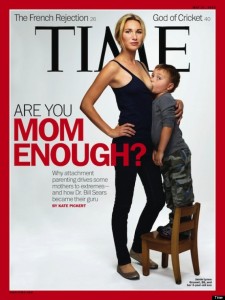Dear Time Magazine…
 Just in time for Mother’s Day, your new issue of Time has been the talk of the nation this week. I’m imagining all the editors basking in the glory. I can see the champagne toasts in the office, the high fives for the “brilliant choice!” on the cover image, the hugs and congratulations for young writer, Kate Pickert for writing a potentially career-changing article.
Just in time for Mother’s Day, your new issue of Time has been the talk of the nation this week. I’m imagining all the editors basking in the glory. I can see the champagne toasts in the office, the high fives for the “brilliant choice!” on the cover image, the hugs and congratulations for young writer, Kate Pickert for writing a potentially career-changing article.
Good for you guys! Wow. You proved shocking, provocative, controversial images and perpetuating the polarization of working mothers versus non-working mothers can stir the pot and sell your tired magazine. You transcended the threat of digital — at least for this week — and can “own the conversation” with your print. BRAVO!
Were finances really so threatened that you had to kick a big part of the population of Moms the week of Mother’s Day?
First, I’m personally not offended by the cover image. I might have nursed my Littlest until she was three. It just didn’t work out that way, and I chose to wean just after her second birthday. But I have friends who nursed until their children were three. Who cares? Why do people have to make up sick stories in their heads that sexualize breastfeeding and decide that small children still breastfeeding are on the path to being “messed up.”? Show me a pre-adolescent boy on his mom’s breast, and I’ll likely join the call to Judge.
The American Academy of Pediatrics recommends exclusive breastfeeding the first six months, and continued breastfeeding for at least the first year. The World Health Organization recommends that continued breastfeeding continue up to 2 years or more years. There’s no denying the scientific, proven — life-saving health benefits. And yet Time decides to paint a picture of extended breastfeeding as “crazy”?!
On the flip side, you could just have easily put together a controversial cover with a woman in a business suit at her office and baby in a daycare crib alone with a bottle and listed a bunch of stats on this baby’s future health risks. But I don’t think my friends who didn’t breastfeed deserve national Shock & Awe criticism either. I have friends who were not interested in trying breastfeeding at all. Straight to formula after birth. I have other friends who tried nursing for a few days and gave up when it wasn’t working for them. Their business.
I’m curious what your end goal really was? I can hear your editorial management staff claiming something noble like: “Let’s start a powerful conversation on parenting that engages people across the country!”
Seems to me the goal was to stir up conflict, insecurity, defensiveness, polarity, and ultimately divisiveness between people — and leverage those emotions to make money. If it were truly about encouraging dialogue, I think you might have chosen less negative language. You would have interviewed and been CURIOUS ABOUT middle of the road Attachment Parenting folks like myself. You would have interviewed people from the national organization.
To make the gross implication that anyone that practices Attachment Parenting breastfeeds their children until they are 4, 5 or 6 years old was a clever, sensational tactic to draw attention to the subject — but it’s just not true and you are choosing willful ignorance to paint that as the norm for Attachment Moms. And trumpeting the “crazy mom” thesis? Just flat out lame.
People who associate themselves with AP like myself have the opportunity to participate in the conversation you started — which is a good thing. But you choosing to write from such a judgmental point of view doesn’t make me feel good. Most Mothers, including myself, tend to have no shortage of self-doubt and worry about the best way to raise emotionally secure human beings.
Your words:
A lot of people might use the same word {crazy} to describe the child-rearing philosophy Joanne subscribes to. It’s called attachment parenting, and its rise over the past two decades has helped redefine the modern relationship between mother and baby. It’s not just staunch devotees like Joanne; the prevalence of this philosophy has shifted mainstream American parenting toward a style that’s more about parental devotion and sacrifice than about raising self-sufficient kids.
First, what do you mean exactly by “self-sufficient”? The infant who has learned to soothe himself? The infant who has learned that no one will attend to him when he’s hungry or upset at night and eventually gives up? Is that how you define self-sufficient? Is it all about being able to go to sleep alone and stay asleep? Or are you making a judgmental leap that babies that nurse “too long” and are tended to at night will grow up to be weak, nervous, and incapable of functioning independently on their own…..?
The childhood formula for self sufficiency: LOVE. Compassion. Attentiveness. Cuddling. Acceptance. Encouragement.
In your video interview, Kate, you imply that anyone who is drawn to Attachment Parenting is likely compensating for something emotionally missed in their own early childhood. You also write that the science is murky. But honestly — for being a Time magazine writer, I really think your own research was weak. Only focusing on Dr. Sears, you miss a library of material on the subject.
My early childhood was wonderful. I have very fond memories of both my parents. I wasn’t drawn to Attachment Parenting because I felt like I missed some critical bonding. I was drawn to Attachment Parenting because I spent a great deal of time studying about pregnancy and infancy before having children and was impacted by the new scientific findings that didn’t exist when I was born.
Aside from the health benefits of breastfeeding touted by the American Academy of Pediatrics and World Health Organization — there’s proven emotional benefit for both mother and child with breastfeeding. And for an infant having his or her needs met in general. You mention nothing in your article about the stress hormone cortisol and the impact to infants when this is consistently elevated. Nor did you write about the positive biochemical benefit of oxytocin and how this is released with breastfeeding and physical connection.
But if you haven’t received thousands of letters by now educating you more on this subject already, I’d be surprised.
Here’s where I may surprise you. While I wish you would not have been so extremist and judgmental (I truly think it was a selfish move on your part to get attention and make money), I do appreciate the opportunity for Attachment Parenting to be self-reflective and take a hard look at the reality of the recommendations put forth that are very difficult, if not impossible, for every woman to adopt. AND I think for anyone who has adopted Attachment Parenting and is unhealthy or in chronic poor emotional state because of lack of sleep, or has taken attachment so far that they’ve sacrificed their marriage and forgone time together without children — this is a good time to self-reflect and consider making some different choices.
Having participated in both extremes — staying home, nursing around the clock for years with 2 children and co-sleeping to working 70 hours a week, only seeing my children for an hour in the morning and an hour at night and insisting we sleep apart during the week so I could get good sleep and function at work — I think I have a unique perspective and appreciation for both types of Moms.
You wrote about Attachment Parenting being misogynist because a woman has to give up her career to do it. Women are choosing to do this. We are grown-ups, intellectually capable of making big life choices including the choice to take a break from careers for focused time with children.
However, there is a serious financial impact for most American families who make the choice to live off one income and the harsher reality of so many single mothers — some of whom don’t have maternity leaves, or have very short ones. How many people have parents like Dr. Sears who “subsidize” them when babies are born so the mother can stay home at no financial loss the family?!
Honestly, my being so hell-bent to be home with my Littles when the recession kicked in and my husband’s business was in trouble nearly destroyed us. Now I’m working my ass off to try and make up for lost income.
Yes, these precious souls new to the world need Big Love and there’s many different parenting styles — all of us loving our children in different ways, all of us with the same goal of raising emotionally stable, self-sufficient young people. And part of being able to love well is when you love yourself — which for many women includes the intellectual satisfaction of a career.
Women who work from home can have it all in my opinion. It’s challenging and takes a ton of discipline and still requires childcare help. But it’s doable. Extended nursing easy. Planned breaks to give children attention at different times during the day — easy.
Women, like myself now, who work in an office twenty-five minutes from home? What we can do is pump during the day and save milk for babies. Though I’m not nursing anymore, I appreciate that the company I work for has reserved private rooms for Moms to do this that can’t be booked for anything else.
Working Mamas can also give our children big, full attention when we get home — quite possibly in a way that the stay-at-home mom can’t because of the compressed time that we have to be together and our guilt. And we can choose to keep sleeping together in a big bed to get that physical connection and cuddle time missed during the day. In our family, we rarely do this now, but we chose to recently the night we got home from taking a week long vacation without our children who at age 3 and 5 happily stayed with my mother.
What we can’t do, is see or be with our children while we’re away at work for 40, 50, 60+ hours a week. And this is what every working mom struggles to deal with emotionally.
I would have loved to see an article the week of Mother’s Day that brought together the different approaches to Motherhood today. In a way that looked to find the common threads. That had a goal of inspiring curiosity versus judgment and bringing people together with compassion and sympathy versus creating division.
Maybe next year?
2 Responses to “Dear Time Magazine…”
Leave a Reply


Recent Posts
- Survival Tips for Working Moms
- Happy Families Are All Alike
- Sitter Stories
- Dear Time Magazine...
Categories
Popular Posts
Blogs I Like...















Bravo! Well said. You are still the most amazing writer I know. And thanks for the kind words about your early childhood. Love you.
Word.
On so many parts. Well said, well written.